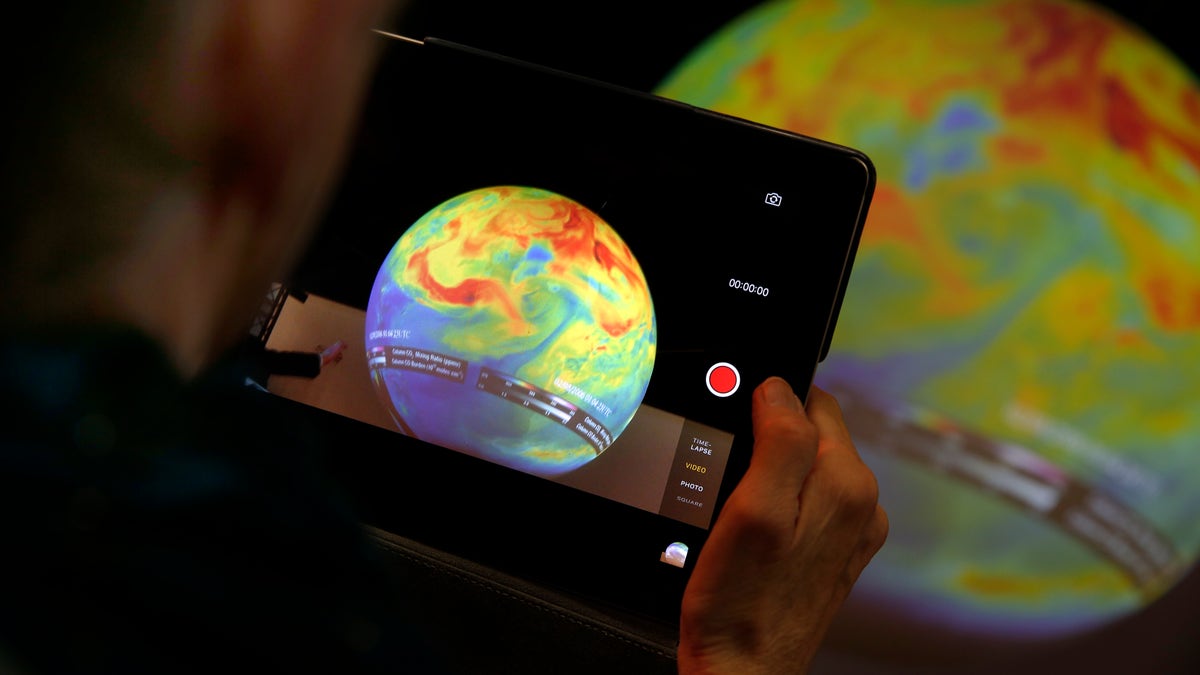
Dec. 7, 2015 - A picture of a globe at the COP21, the UN Climate Change Conference in Le Bourget, north of Paris. World governments are meeting to seek a solution to climate change, focusing on reducing emissions of carbon dioxide and other greenhouse gases, primarily by shifting from oil, coal and gas to cleaner energy sources. (AP)
We recently joined nearly 400 other climate scientists, physicists, mathematicians, economists, theologians, philosophers, and ethicists in signing An Open Letter on Climate Change to the People, their Local Representatives, the State Legislatures and Governors, the Congress, and the President of the United States of America.
We did so for one simple reason: Proposals to fight climate change doom billions of people to live in extreme poverty, a fate much worse than global warming.
The global community has made remarkable progress in its fight against poverty. The UN’s Millennium Development Goals (MDGs) aimed to halve the number of people living below $1.25 per day by 2015. We thank the Lord that that target appears to have been met.
How? By economic growth, primarily in China.
The underlying foundations of climate predictions mean that, if one is truly interested in the well-being of poor people, the only realistic policy is to help improve their economic conditions. Even if that means allowing the climate to warm, it is unlikely that it would warm enough to pose danger, let alone a danger as great as poverty.
Despite this, many people continue to live in abject poverty. One-quarter to one-third of the world’s population —1.75 billion to 2.33 billion people—lack access to electricity, and all but three million of those live outside rich, developed countries. Worse yet, some 2.7 billion still cook their food on inefficient stoves that use dung, crop residues, and wood. It is estimated that 2 to 4 million people die prematurely each year because of health problems associated with biomass-burning stoves.
Although the MDGs do not talk about economic development, economic growth is the only way for whole societies to rise out of poverty. And economic development cannot occur without abundant, affordable, reliable, non-intermittent, on-demand energy.
Many climate scientists argue that we need to mitigate global warming because it will most hurt the poor. Apparently these scientists do not understand their own models.
Projections from climate models are based on the rates of poverty reduction. According to these models, the highest temperature projections occur when the poorest people in the world increase their incomes from $246 (measured in constant 1990 USD) to $49,000 per year by the end of the 21st century—or approximately the U.S. GDP per capita in 2014.
On the other hand, the lowest temperature projections result when per capita income of the poorest people rises to only $3,850 annually. Although that is some 15 times more than their current incomes, it still does not ensure levels of health, long life, and other benefits people in the developed world have taken for granted for a generation or more.
Overcoming poverty brings with it enormous benefits to health and every other measure one cares to choose. Rich people can cope not only with natural catastrophes but also with different climates—from the Arctic Circle to the Equator, from Death Valley to the Amazon rainforest—better than poor people. Adequate wealth more than outweighs any damage from climate change.
Mitigating man-made climate change, or anthropogenic global warming (AGW), requires reducing economic growth. It follows that what the advocates of AGW mitigation prescribe, is to trap the world’s poor in their poverty and all the suffering that entails.
The underlying foundations of the climate predictions mean that, if one is truly interested in the well-being of poor people, the only realistic policy is to help improve their economic conditions. Even if that means allowing the climate to warm, it is unlikely that it would warm enough to pose danger, let alone a danger as great as poverty.
By contrast, the foundational assumption in the IPCC climate models leads to the following conclusion: Rising CO2 emissions are, for the most part, a side effect of alleviating global poverty. To mitigate climate change we must force the vast majority of humankind to continue living in abject poverty.
Preventing climate change does not help the poor, it dooms them! Poverty simply kills more people than climate. Consequently, it would be immoral to deny the poor the ability to rise from poverty by curtailing their access to abundant, affordable, reliable energy, all in pursuit of an environmental objective that only interests one billion rich people.
So that’s why we’ve endorsed the Open Letter. It conveys this message in a powerful way, a message that the American people and their leaders—and people around the world—need to hear.
Dr. Neil Frank, Ph.D. (Meteorology) is the former Director of the National Hurricane Center and retired Chief Meteorologist at KHOU-TV in Houston, TX.
Dr. Wayne Grudem, Ph.D. (New Testament) is a Research Professor of Theology and Biblical Studies at the Phoenix Seminary in Scottsdale, AZ.
Dr. Jeffrey Haymond, Ph.D. (Economics), M.S. (Mechanical Engineering) is a Dean and Associate Professor at the School of Business Administration at Cedarville University in Cedarville, OH.
Dr. Tracy C. Miller, Ph.D. (Economics) is an Associate Professor of Economics at Grove City College in Grove City, PA.
Dr. Roy W. Spencer, Ph.D. (Meteorology) is a Principal Research Scientist in Climatology at the University of Alabama in Huntsville. He is also U.S. Science Team leader for the Advanced Microwave Scanning Radiometer (the source of satellite global temperature data) flying on NASA’s Aqua satellite
Dr. David Wells, Ph.D. (Theology) is a Distinguished Research Professor at Gordon-Conwell Theological Seminary in South Hamilton, MA.
